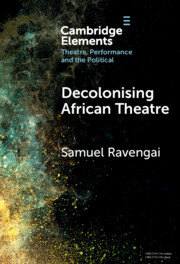Element contents
Decolonising African Theatre
Published online by Cambridge University Press: 21 March 2024
Summary
- Type
- Element
- Information
- Online ISBN: 9781009271455Publisher: Cambridge University PressPrint publication: 11 April 2024
References
- 8
- Cited by

